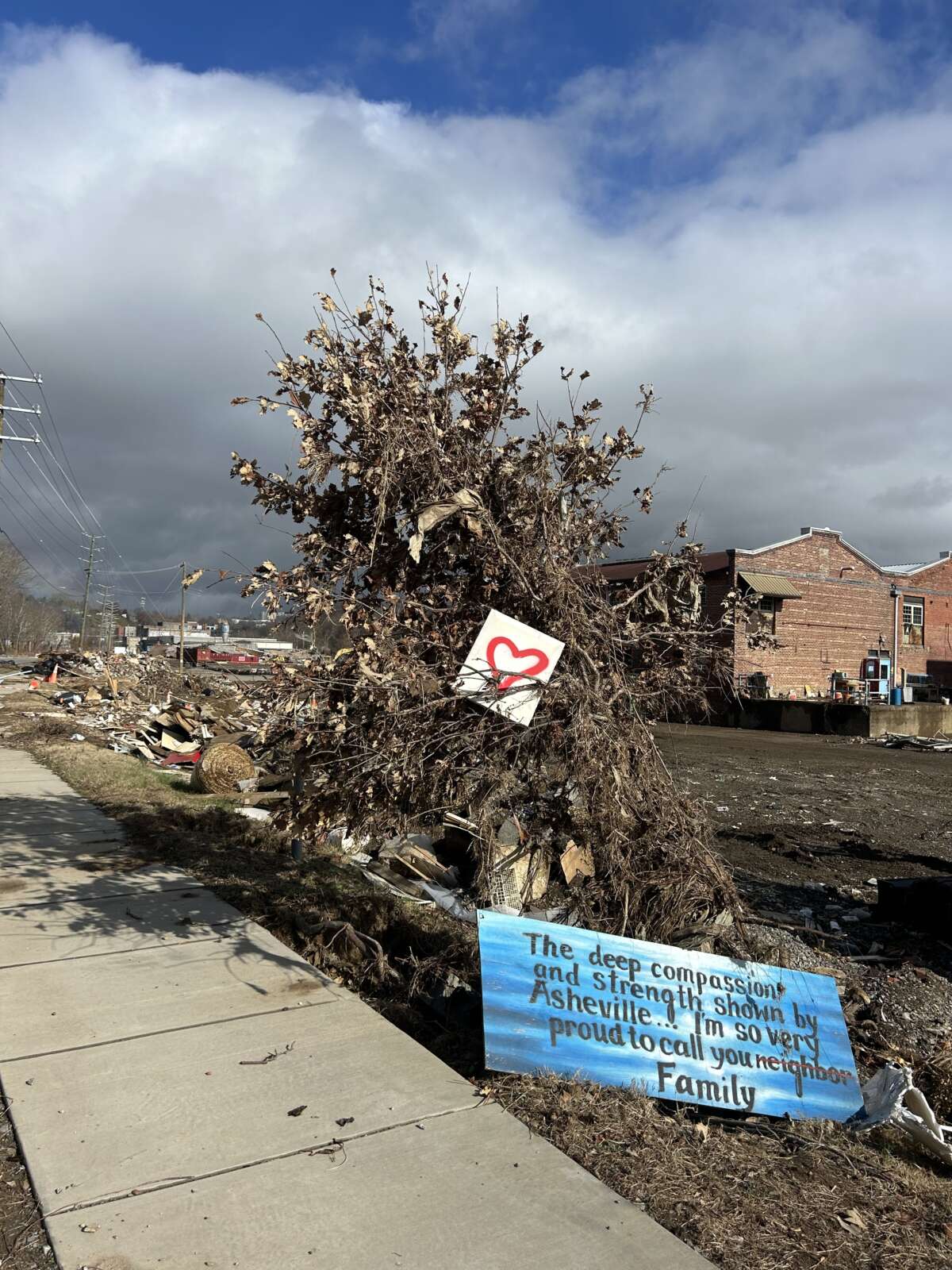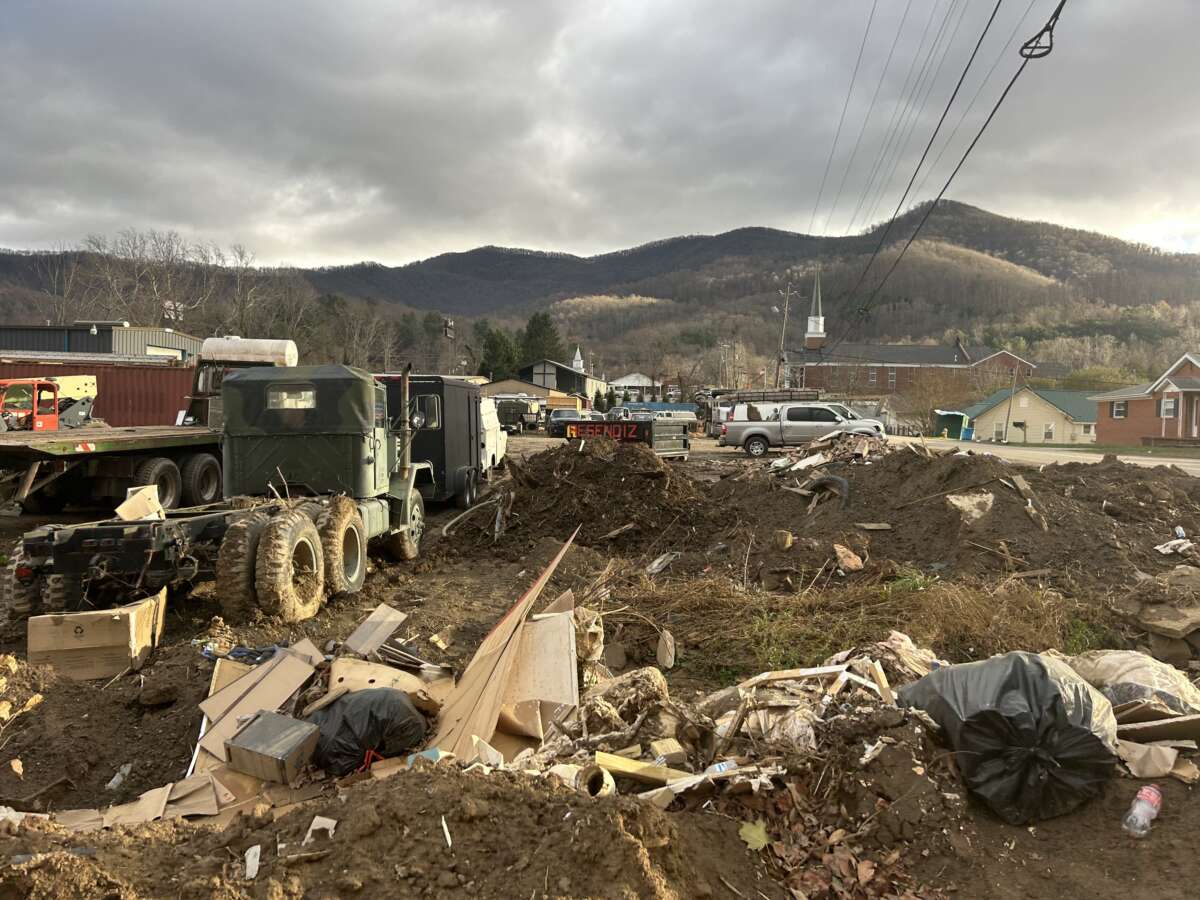Support justice-driven, accurate and transparent news — make a quick donation to Truthout today!
The autumn sun was sinking low behind the Blue Ridge Mountains as we pulled into Swannanoa. It was Thanksgiving Day, and two months since Hurricane Helene ransacked the Southeast. The small town, like so many communities across western North Carolina, was still a scene of utter devastation. Heaping piles of debris dotted the roadside, and neighborhoods of collapsed homes sat empty in the cold dusk light. On the window of one building, someone had spray-painted a message: “WE ALRIGHT.”
This was not the Thanksgiving Day anyone had envisioned months ago. But inside the kitchen of a local bakery, volunteers with Grassroots Aid Partnership (GAP) gathered to cook up a community feast — just like they’d been doing every day for weeks. That day we were prepping turkeys, whole birds stuffed with fresh herbs and citrus, pulled piping hot from the smoker. A GAP volunteer told me that, even though the area’s water service had recently been restored, the community’s need for aid was still there. GAP planned to continue cooking, serving and delivering hot meals through the end of the year, at least.
GAP is just one of many groups across western North Carolina that have mobilized in the wake of Hurricane Helene, and I was grateful to spend three short days helping with various relief efforts over the Thanksgiving holiday. Since the late September floods, the outpouring of community support has been held up by national media as an example of what grassroots solidarity looks like in action. Now, as the year winds down and the threat of Donald Trump’s second administration looms, I can’t stop thinking about the lessons we can glean from the region’s hurricane response.
After Trump’s reelection, social media exploded with calls for the left to get organized. It’s a crucial directive, but one that might seem near-impossible in these highly atomized times. Again and again, I saw or heard people lamenting that, while they would love to “get organized,” they weren’t really sure what that could look like in practice. X, the platform formerly known as Twitter, erupted in debate over one viral infographic that listed things like “community gardening” and “talking to your neighbors” alongside mutual aid fundraisers as examples of ways to organize. Critics said that calling everything “organizing” diluted its meaning and political potential; others noted that finding ways to build community is an important first step to fostering a working-class movement.

Indeed, part of why western North Carolina’s recovery response to Helene was so swift was because of the community networks already in place before the storm. Appalachian communities have a long history of mutual aid, since remote landscapes and years of government abandonment have forced self-reliance in the historically poor region. There’s also a culture of knowing your neighbors — regardless of whether or not an online infographic has told you to. Even though I grew up in central North Carolina, I’ve spent the last eight years in major cities; whenever I return home, I find myself caught off guard by the genuine warmth of strangers. This has long been the reality, of course, in most places across the country, but it’s also true that many people have felt their organic connections to others fracture in recent years.
Social media and the COVID-19 pandemic, in particular, have caused a troubling loneliness epidemic to take hold. In suburban areas — where most U.S. residents live — the architecture itself inhibits social connection. The rise of consumer surveillance technologies like the Ring camera, or crowd-sourced public safety maps like the Citizen App, fuel an all-pervading fear of crime that is out of step with national trends. A nationwide surge of far-right extremism, stoked in part by Trump’s hateful rhetoric, has fanned the flames of political division. Meanwhile, “third places” — spaces for people to gather outside of home or work — are disappearing across the country. In these sorts of conditions, it’s hard to build trust among neighbors.
This is also part of why spiritual communities have played a large role in western North Carolina’s Helene recovery efforts. It can’t be overlooked that the many churches scattered throughout the region have been instrumental in getting help to the people who need it. Churches are a conventional third place, offering both a built-in community of people and the space to gather them. As tax-exempt entities with traditions of tithing, churches also often have the funding structures in place to do aid work.
What can we learn from this? Churches are only one piece of the puzzle. A large part of the battle is just (a) finding a network of people, and (b) having the physical space for them to come together, in whatever form that may take. Financial resources, of course, are critical — but it’s hard to put them to good use without the first two building blocks.

People in western North Carolina have found creative ways to make relief work happen. GAP uses the kitchen facilities of the Swannanoa bakery, Blunt Pretzels, to cook meals. But it hasn’t always been this way: One volunteer told me that, in the immediate aftermath of the storm, without any electricity or running water, a few people set up shop in the parking lot and used pepperoni slices from Subway to make strombolis. Now, they’ve been flush with supplies, donations and volunteers, including receiving potable water and food deliveries from World Central Kitchen. As a dozen people helped clean up on Thanksgiving Day, the volunteer looked around the kitchen in awe: “Wow,” he said. “We sure have come a long way.”

Just down the road from Blunt Pretzels, Silverados, an outdoor concert venue on the border of Swannanoa and Black Mountain, has turned into a temporary hub for people to donate, sort and receive supplies. Neon vest-clad volunteers open the gates every morning and organize cars into either pick-up or drop-off lines. The site has everything from bottled water to tents, baby formula and Christmas toys. Nobody is turned away: Check off what you need from a list, and volunteers will run to different shipping containers to collect the goods.
When I visited to drop off supplies, I was struck by how well-organized the massive hub had become in just two months; it’s rare to see something run entirely by volunteers operate with such efficiency and logistical finesse. I walked away thinking about how I wished something like it could exist all the time, for anyone that needs support, regardless of whether or not a hurricane has struck. How motivated many are to mobilize people when a disaster feels particularly acute — never mind the fact that the crisis of poverty is, for many people, experienced as an emergency every single day.
GAP is a nonprofit organization, as is the Silverados supply hub, which is now registered as the 501(c)(3) Valley Strong Disaster Relief. But if you start talking to people on the ground, you realize that much of the work in the region has been done outside of nonprofit scaffolding. For two days, for instance, my mother and I helped an elderly couple in Barnardsville, a rural area about 20 miles outside of Asheville, whose farmhouse and property had been pummeled by the flooding of a nearby creek. We showed up knowing very little: My mom had found them through a Facebook post, called a phone number and decided we should show up one day. When we were there, we learned that they’d been receiving countless volunteers on a near-daily basis — word of mouth and Facebook had spread their requests for help far and wide.

It’s important to note that much of the Helene relief work is not being done on explicitly political grounds. Outside of Asheville, western North Carolina leans quite red. And so it’s taken a cross-coalition of people and groups, from various backgrounds, to fill in the gaps where the government has failed. For those of us on the left, attaching political development and anti-racist class consciousness to this grassroots work is crucial. But that can’t happen if people are splintered and frozen, infighting online or doing nothing at all.
In a way, I think that fixating on the semantics of phrases like “mutual aid” and “community organizing” can start to act as barriers to doing the work that needs to be done. No, simply getting to know your neighbors is not the same as organizing — but how many people hear that and then simply do nothing at all? How much good could be accomplished if everyone, everywhere committed to doing some form of mutual aid work today? And how can we think strategically about galvanizing the communities of which we are already apart? Start small. Start now.
A terrifying moment. We appeal for your support.
In the last weeks, we have witnessed an authoritarian assault on communities in Minnesota and across the nation.
The need for truthful, grassroots reporting is urgent at this cataclysmic historical moment. Yet, Trump-aligned billionaires and other allies have taken over many legacy media outlets — the culmination of a decades-long campaign to place control of the narrative into the hands of the political right.
We refuse to let Trump’s blatant propaganda machine go unchecked. Untethered to corporate ownership or advertisers, Truthout remains fearless in our reporting and our determination to use journalism as a tool for justice.
But we need your help just to fund our basic expenses. Over 80 percent of Truthout’s funding comes from small individual donations from our community of readers, and over a third of our total budget is supported by recurring monthly donors.
Truthout has launched a fundraiser to add 379 new monthly donors in the next 6 days. Whether you can make a small monthly donation or a larger one-time gift, Truthout only works with your support.
